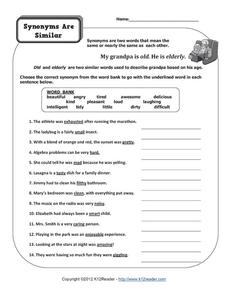K12 Reader
Charge It!
Electrify your pupils' interest in conductors and insulators with a brief reading passage! After reading the text, learners respond to five questions that relate to the content of the passage.
K12 Reader
Gold Rush Boomtowns
The California Gold Rush sparked many people to try for their fortunes and led to the formation of some well-known California cities. Have your class read about the changes that happened and then respond to the five included questions.
K12 Reader
Noun Clauses: Acting as a Noun
Noun clauses and how they function in sentences is the focus of this exercise, the final resource in a series of 36 grammar worksheets.
K12 Reader
Water Carves the Land
What affect do bodies of water have on the world around us? Kids can find out by reading this passage. After reading, they answer five questions related to the text.
K12 Reader
Geometric Shape Names
Combine math and language arts in the same lesson with a reading passage about number prefixes in geometric shapes. After reading several short paragraphs about the different prefixes used in shape names, kids answer five comprehension...
K12 Reader
In Danger of Extinction
What happens when a species becomes extinct? Sharpen your reading skills with a passage about how koalas have gotten close to being an endangered species.
K12 Reader
Eratosthenes: Geographer and Mathematician
Mathematicians can be famous, too! Introduce your class to Eratosthenes with a reading passage. After they complete the passage, learners respond to five questions, some of which require opinions and others reading comprehension skills.
K12 Reader
Discrimination Against Gold Rush Immigrants
Immigration to the US has been a topic of discussion for many years. Inform your class about discrimination against immigrants during the Gold Rush with a short reading passage. After reading, class members answer five questions related...
K12 Reader
What Glaciers Leave Behind
Glaciers may seem distant and stationary, but they are huge deposits of moving ice that have made changes to the earth's surface. Your pupils can learn about the different types of impressions left by glaciers by reading the short...
K12 Reader
Expressions with Parentheses
Introduce your class to the order of operations. Included here is a reading passage that explains the concepts and provides an example and five related questions for individuals to answer.
K12 Reader
They See with Their Ears
Sometimes bats get a bad rap, even though they are fascinating creatures! Teach your class about echolocation with a reading passage. After reading, class members respond to five questions based on the text.
K12 Reader
Endangered Species
Your learners have likely heard about animals going extinct. By reading this passage, they can find out some reasons why this happens and how to protect endangered species. After reading, individuals respond to five related questions.
K12 Reader
Estimation
Teach your class a thing or two about making educated mathematical guesses. Learners read a passage that explains estimation and approximate and exact answers. They then respond to five questions about and related to the text.
K12 Reader
Phases of the Moon
Take one giant leap for mankind with a reading passage about the moon. Kids learn about the lunar cycle with context clues and reading comprehension questions, making it a good informational text for your language arts lesson.
K12 Reader
Many Ways to Measure
Measurement tools, yardsticks, scales, and thermometers, are the subject of a reading comprehension worksheet that asks kids to answer a series of questions based on the provided article.
K12 Reader
Synonyms Are Similar
Kids select a word from the provided bank that is similar in meaning to the underlined word in 14 sentences.
K12 Reader
Synonym Circus
After matching 13 words with a list of synonyms, kids craft a short paragraph about the circus using the provided synonyms.
K12 Reader
Using Antonyms for Context Clues
Readers use the antonyms provided within a sentence to help them determine the meaning of underlined words in the sentence. The worksheet is the final resource in a series that provides opportunities to kids to demonstrate their...
K12 Reader
Synonyms or Antonyms?
To demonstrate their understanding of synonyms and antonyms, kids label pairs of words as either the same or opposite in meaning.
K12 Reader
Playground Antonyms
There are opposites all around you, even at school! Using an antonym word bank with playground-themed words, young learners complete sentences opposite in meaning from the ones provided.
K12 Reader
Identify the Antonym
What happens to a sentence when you replace a word with its antonym? A two-part instructional activity asks learners to select words opposite in meaning to provided words, and then to craft sentences using antonyms for given words.
K12 Reader
Antonyms are Opposites
Knowing the opposite of your chosen word is a great step in improving your word choice. Young readers select an antonym from the provided word bank to complete a series of 14 sentences.
K12 Reader
Antonym Animals
What's the antonym for wild? What's the opposite of young? Young readers identify the antonyms in a series of ten sentences. Next, they jot down the word pairs to reinforce the relationship between each set of antonym.
K12 Reader
Opposite Words: Verbs Antonym Worksheet
Verbs are the featured on an antonym learning exercise that asks kids to provide a word opposite in meaning from the pictured verb.























